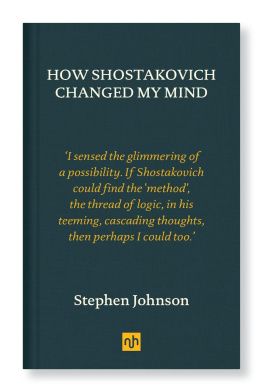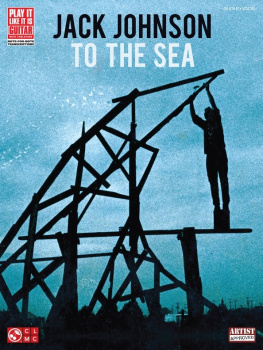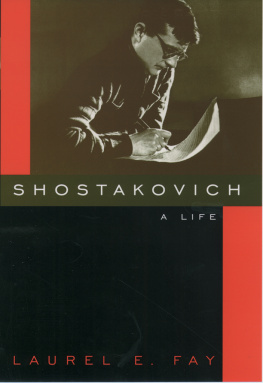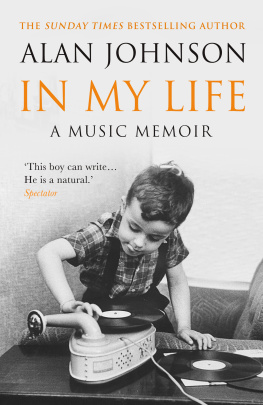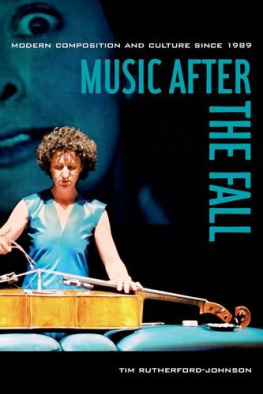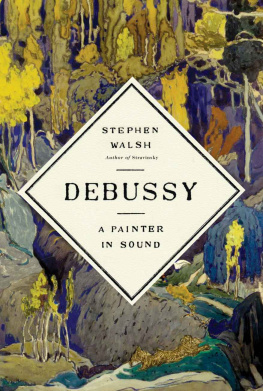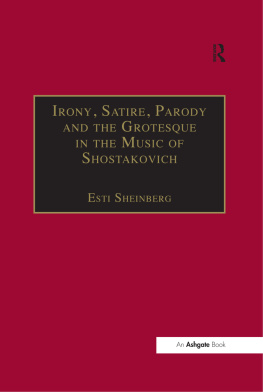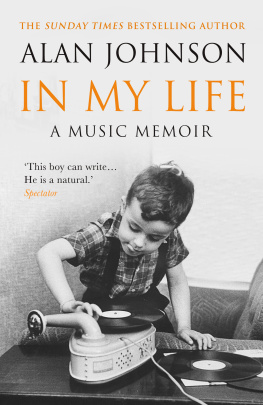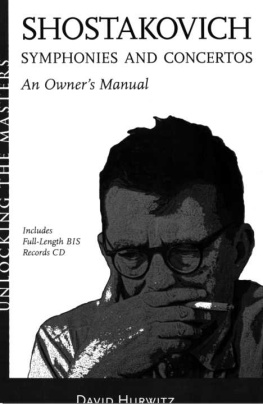Stephen Johnson - How Shostakovich Changed My Mind
Here you can read online Stephen Johnson - How Shostakovich Changed My Mind full text of the book (entire story) in english for free. Download pdf and epub, get meaning, cover and reviews about this ebook. year: 2018, publisher: Notting Hill Editions, genre: Non-fiction. Description of the work, (preface) as well as reviews are available. Best literature library LitArk.com created for fans of good reading and offers a wide selection of genres:
Romance novel
Science fiction
Adventure
Detective
Science
History
Home and family
Prose
Art
Politics
Computer
Non-fiction
Religion
Business
Children
Humor
Choose a favorite category and find really read worthwhile books. Enjoy immersion in the world of imagination, feel the emotions of the characters or learn something new for yourself, make an fascinating discovery.
- Book:How Shostakovich Changed My Mind
- Author:
- Publisher:Notting Hill Editions
- Genre:
- Year:2018
- Rating:5 / 5
- Favourites:Add to favourites
- Your mark:
- 100
- 1
- 2
- 3
- 4
- 5
How Shostakovich Changed My Mind: summary, description and annotation
We offer to read an annotation, description, summary or preface (depends on what the author of the book "How Shostakovich Changed My Mind" wrote himself). If you haven't found the necessary information about the book — write in the comments, we will try to find it.
How Shostakovich Changed My Mind — read online for free the complete book (whole text) full work
Below is the text of the book, divided by pages. System saving the place of the last page read, allows you to conveniently read the book "How Shostakovich Changed My Mind" online for free, without having to search again every time where you left off. Put a bookmark, and you can go to the page where you finished reading at any time.
Font size:
Interval:
Bookmark:

Notting Hill Editions is an independent British publisher. The company was founded by Tom Kremer (19302017), champion of innovation and the man responsible for popularising the Rubiks Cube.
After a successful business career in toy invention Tom decided, at the age of eighty, to engage his passion for literature. In a digital world where time is short and books are throwaway, Toms aim was to restore the art of the essay, and to create exceptionally beautiful books that would be cherished.
Hailed as the shape of things to come, the family-run press brings to print the most surprising thinkers of past and present. In an era of information-overload, these collectible pocket-size books distil ideas that linger in the mind.
www.nottinghilleditions.com
And yet his sister played so beautifully. Her face was turned to the side, intently and sadly following the notes on the page. Gregor crept forward a little further, keeping his head near to the ground so that his eyes could meet hers. How could he be a brute beast, if music could make him feel like this?
Franz Kafka, Metamorphosis
D id Dmitri Shostakovich know these words? Ive been told that he loved Kafka, but then Ive been told a lot of things by people who knew and worked with him, this towering, enigmatic composer, and reconciling them isnt always possible. He was a man used to wearing masks; survival in Stalins terrifying dictatorship demanded that of all its public figures. Shostakovich appears to have developed a habit of telling people, even friends, what he thought they wanted to hear. The number of intimates in whom he truly confided was probably very small, and even then he did so only at carefully chosen moments. Shostakovich was also a composer first and foremost, and like many composers he seems to have been innately suspicious of words as a vehicle for his truest, most private thoughts.
If Shostakovich did indeed read Kafkas famous bleak parable, perhaps in a copy provided by a brave friend or tracked down via the black market, its hard to believe that he wouldnt have lingered a moment or two over that passage, and particularly over its final question. That it concerns music would have been reason enough, but in the context of Kafkas story its so unexpected. After his nightmarish transformation into a giant insect, Kafkas Gregor Samsa has found his family alternately shocked, pitying, and hostile, eventually retreating into a kind of numbed indifference. His own case seems hopeless. But then comes the sound of the violin, Gregors sister absorbed intently and sadly in her playing, and that question, like a sudden but oblique shaft of light: How could he be a brute beast, if music could make him feel like this? Its easy to picture Shostakovich asking himself something similar at crisis points in his switchback career: times when, crushed by official condemnation, vilified by colleagues and friends, tormented by doubts about his artistic integrity, even his own fundamental human worth, he somehow found the strength to keep going, and keep writing.
But the present book is emphatically not an attempt to reach some real Shostakovich to drag him out from behind his complex array of masks and defensive walls and say Behold the man! In fact, this isnt really a book about Shostakovich at all, rather about what his music like that of Gregor Samsas violin-playing sister has made people feel: Russians who lived with Shostakovich through the horrors of Stalinism; Westerners who have felt that in some way this music is also addressed to them; and myself, survivor of a three-times diagnosed bipolar disorder, for whom music, and particularly Shostakovichs music, has been a lifeline.
At this point I can imagine some readers experiencing a jolt of disbelief: Shostakovich? This is not the sort of music most people would choose to cheer themselves up with, or at least not at times of what Sigmund Freud called ordinary unhappiness the kind of unhappiness that stops some way short of the pathological. Shostakovichs fifteen symphonies and string quartets, his concertos, songs, and his opera Lady Macbeth of the Mtsensk District contain some of the darkest, saddest, most violent, bitter, heartwrenching music written in the twentieth century. Surely it should have the opposite effect, dragging listeners down to its own level, or at best offering some perverse or even masochistic pleasure? Yet time and time again, the stories I have heard about the effects of Shostakovichs works, especially on those going through emotional or spiritual ordeals, tell of something very different. At times when suffering has come close to crushing their spirits, listeners who have heard their own feelings reflected back so vividly and truthfully have asked themselves something like the question that stops Gregor Samsa in his own depressive tracks: How can we be wretched, despicable beings when music can make us feel well, like this?
That question is the underlying theme of this book. Merely identifying how music can make us feel is already a huge challenge. Its all so bound up with the subjective instant, the moment of intense engagement with music that so often evades our attempts at conscious rationalisation. In attempting to understand, I have been greatly encouraged and helped by talking to neurologists, psychologists, psychotherapists, philosophers, and musicians, partly through my work with The Musical Brain, a charitable trust bringing together experts in the arts, sciences and the mind, and partly through research I carried out for several related articles and radio documentaries. Neurological science has made big strides in understanding how the brain processes, and, at a deeper intellectual and emotional level, makes sense of music. Some neurological insights have impressed me profoundly, particularly those into how music can help us adjust to traumatic experience. The insights offered by such lucid and musically perceptive colleagues as Michael Trimble, author of The Soul in the Brain and Why Humans Like to Cry: Tragedy, Evolution and the Brain, will be drawn upon in this book. So too will be the thoughts of philosophers ancient and modern, poets, playwrights, novelists, musicians and amateur music-lovers. I have also been privileged to meet many Russian musicians, writers, and thinkers who knew Shostakovich, and shared his experience of trying to survive under rigidly enforced Soviet Communism. In putting together some of their observations, speculations, arguments, and anecdotes I hope to give readers the opportunity to form a larger picture. I am keenly aware that, when it comes to Shostakovich, some readers grasp of the background may be sketchy at best, so a fair amount of historical and biographical scene-painting will be necessary. Fortunately, the story of Shostakovichs life and times is one of the most dramatic, stirring, at times even darkly comical in the history of classical music. Some of it defies belief, and there have been times when, re-telling parts of it, I have found myself pausing incredulously. There exists, however, a wealth of eyewitness accounts, as the reader will soon discover.
Before we come to historical background, I do need to say a word or two about the personal element. When I began writing this book, I hoped to keep the confessional strand to a minimum. In time, I realised that my private experience was directly relevant: after all, if the subject of this book is how music can make listeners feel, then my own experiences are the very kind Im best placed to describe. When I made the BBC radio documentary Shostakovich: A Journey into Light, my producer, Jeremy Evans, persuaded me to record a couple of short links about how I felt Shostakovichs music had helped me come to terms with serious clinical depression. In the reaction that followed the broadcast, a number of people journalists, medical professionals, and non-specialist listeners commented on these parts of the programme, all of them positively. Since then, talks Ive given and articles Ive written on this subject have repeatedly drawn the same appreciative response. What Im talking about is not simply my personal journey: rather, its a testimony to the sustaining, uplifting, ultimately restorative power of Shostakovichs music. It is only one of many such testimonies, others of which are much more dramatic and impressive than mine. And it is with one of the most remarkable of these that this book begins.
Font size:
Interval:
Bookmark:
Similar books «How Shostakovich Changed My Mind»
Look at similar books to How Shostakovich Changed My Mind. We have selected literature similar in name and meaning in the hope of providing readers with more options to find new, interesting, not yet read works.
Discussion, reviews of the book How Shostakovich Changed My Mind and just readers' own opinions. Leave your comments, write what you think about the work, its meaning or the main characters. Specify what exactly you liked and what you didn't like, and why you think so.

